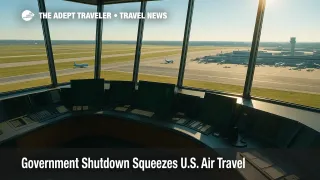Government shutdown squeezes U.S. air travel

Paychecks stopped this week for more than 13,000 air traffic controllers and about 50,000 Transportation Security Administration officers as the federal shutdown entered its third week. Union leaders warn stress and distractions are rising in towers and control rooms, while Transportation Secretary Sean Duffy has threatened discipline for controllers who call in sick. For now, nationwide delay totals look similar to last week, with the recent nor'easter responsible for many disruptions early in the week.
Key points
- Why it matters: Pay interruptions can compound chronic staffing shortages and increase operational risk.
- Travel impact: Expect periodic delays at major hubs and longer TSA lines during peak banks.
- What's next: Officials warn sick-outs could trigger wider delays if participation grows.
- NATCA is urging controllers to keep working and pressing for an end to the shutdown.
- Weather remains a swing factor after a mid-October nor'easter in the Northeast.
Snapshot
NATCA President Nick Daniels says controllers are weighing second jobs to make ends meet, a distraction that can add risk in complex airspace. Duffy, the Transportation Secretary, has warned that controllers who call in sick during the shutdown could face termination, even as facilities remain short of target staffing. TSA's front-line workforce, largely working without pay, is also under strain, with longer lines likely at peaks. Delay totals so far mirror last week, in part because a nor'easter drove much of the early-week disruption rather than staffing. Travelers should arrive early, carry on if possible, and watch airline apps for rolling schedule changes.
Background
The FAA's Air Traffic Organization manages more than 44,000 to 45,000 daily flights that carry over 3 million passengers. Controller staffing has lagged targets for years, with estimates of roughly 14,000 certified controllers nationwide and a shortfall on the order of 3,500 compared with optimal levels. That chronic gap magnifies the impact of any sick-outs or missed shifts, especially at high-volume facilities. Meanwhile, TSA's workforce totals about 60,000 employees, including approximately 50,000 officers who staff airport checkpoints. When those employees work without pay during shutdowns, absenteeism historically nudges higher, lengthening lines and pushing travelers to arrive earlier than usual.
Latest developments
Pay stops, pressure rises for controllers and TSA
On Tuesday, October 14, controllers and TSA officers received their last paychecks until the shutdown ends, intensifying financial pressure. Daniels said controllers have become "pawns," warning that worry over making rent can distract from separating aircraft safely. NATCA is publicly encouraging members to remain on position and is lobbying for a resolution. At airport curbside events, union members handed leaflets to passengers explaining the stakes. For passengers, the immediate effects are subtle, but stress and overtime at facilities can add friction during morning and afternoon push periods.
Duffy warns of firings if sick-outs expand
Duffy has cautioned that controllers who skip shifts during the shutdown could be fired, calling some absentees "problem children" in a televised interview. He has also asserted that staffing now accounts for 53 percent of delays, up from a typical five percent, a figure outlets have reported but that has not been independently verified. NATCA continues to oppose coordinated absences, emphasizing the legal and career risks. Any broadening of sick-outs would likely produce visible delays at large hubs and ripple impacts at regional airports.
Weather muddied the picture early this week
A strong nor'easter from October 11 to October 14 produced high winds, coastal flooding, and low ceilings across the Northeast, driving ground delays and cancellations at multiple airports. That storm explains a large share of early-week disruption, masking any shutdown-related changes in the delay baseline. As conditions normalize mid-week, analysts will get a cleaner read on whether staffing stress is affecting throughput.
Analysis
For travelers, the most practical takeaway is to build slack into the journey while the shutdown continues. Peak-bank queues at TSA checkpoints can stretch when even a small fraction of officers are absent or reassigned, and tower or center overtime can slow pushbacks or flow programs during weather. Watch for bottlenecks at early-morning departures and late-evening arrivals, and verify baggage delivery norms on tight connections. Airlines may proactively pad schedules or swap aircraft to protect operations, so same-day notifications matter more than usual. If you are flying through Reagan Washington National Airport (DCA) or Newark Liberty International Airport (EWR), leave extra time; those facilities have been in the spotlight during shutdown coverage and the recent storm. For rolling, airport-specific impacts, see our daily tracker: Flight delays and airport impacts: October 15, 2025.
Final thoughts
The U.S. aviation system is resilient, but it runs on people. With pay paused and stress rising, even small absenteeism can echo through tightly scheduled hubs. Weather remains a wild card, and that masked some effects early this week, but the longer the shutdown lasts, the greater the risk of sustained delays. Until there is a funding resolution, the smartest play is simple, arrive early, travel light, and monitor apps closely, especially if you are connecting through busy hubs. That is the reality of government shutdown air travel.
Sources
- US air safety at risk with traffic controllers as 'pawns' in shutdown, Reuters
- Nick Daniels, President, National Air Traffic Controllers Association, NATCA
- NATCA President Nick Daniels and members meet with Transportation Secretary Sean Duffy, NATCA
- TSA at a Glance factsheet, Transportation Security Administration
- Air Traffic by the Numbers, Federal Aviation Administration
- Air traffic controllers who duck unpaid work during the shutdown could be fired, Associated Press
- Duffy hints at firing air traffic controller 'problem children,' Politico
- Nor'easter shuts down roads, knocks out power up and down the East Coast, The Weather Channel
